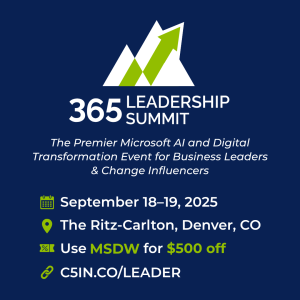Event Preview: Avoiding AI Transformation Failure

This article is sponsored by the 365 Leadership Summit: the AI-first, Microsoft-focused business event where leaders will gain proven strategies to drive AI adoption, lead change, and realize ROI.
Generative AI solutions like Microsoft Copilot have the potential to reshape the workplace, but success isn’t guaranteed. Leadership plays a make-or-break role in whether organizations realize AI’s value.
AI transformation was the focus of a recent MSDW Podcast featuring Prachi Mishra (AI Business Solutions Engineer at Microsoft) and Geoff Ables (Microsoft MVP and CEO of C5 Insight). Together, they discussed both the risks and strategies that separate AI success stories from failures.
They shared valuable insights on topics like change management, AI leadership, and Copilot adoption strategies, which will take center stage at the upcoming 365 Leadership Summit on September 18–19 at The Ritz-Carlton, Denver.
AI is a major topic at work, but the podcast highlighted a key issue: AI transformation failure.
AI Revolution: From Skepticism to Impact
Reflecting on his time leading one of the world’s largest data warehouse projects at Wells Fargo, Ables saw AI tools in action early on, but said “the digital transformation hype didn’t quite live up to its expectations.”
Today, some analysts project that AI could become a $600 billion industry in just a few years, outpacing the adoption of previous digital revolutions such as mobile phones. When he saw ChatGPT and Copilot emerge, Ables said, “I understood the potential for what they could do. I’m not a skeptic anymore.”
To illustrate AI's real-world business impact, Ables referenced a client that is using AI to reduce recurring EDI errors, cutting a single employee’s workload by 30%. He also pointed to forecasts estimating that AI could automate up to half of a CEO’s responsibilities, adding that he has already delegated 9–12% of his own executive tasks to AI.
AI Shelfware: Delivering Value or Collecting Dust?
AI is transforming the future of work, but “shelfware” is a hidden and costly risk, Ables cautioned. Shelfware refers to software that’s purchased and implemented but rarely or never used. It quietly adds recurring expenses through unused licenses, often missed during budgeting and renewal cycles. Identifying and eliminating shelfware is key to optimizing your business technology spend and maximizing ROI. If left unchecked, it can create hesitation around adopting new technologies and hinder innovation.
AI Adoption: The Human Element
Both Ables and Mishra agreed that technology isn’t usually the primary reason transformation efforts fail. The root problem is with people and processes. Prachi Mishra shared that even Microsoft’s internal teams initially struggled to adopt Copilot. Adoption required daily practice, which she described as “building a muscle,” until it became second nature. She emphasized the importance of intentional change management and adoption strategies, not just implementing new AI tools.
AI Implementation: Customer Zero
Mishra and Ables both shared how treating their own teams as “customer zero” has allowed Microsoft and C5 Insight to lead by example. By deploying Copilot internally first, they were able to identify challenges, refine best practices, and build confidence in the tool. This first-hand experience allowed Microsoft and C5 Insight to guide clients more effectively, offering real-world insights and proven strategies for successful AI adoption.
AI Agents: Digital Coworkers
Ables and Mishra described AI agents as digital coworkers that go beyond automation to handle tasks more independently. Mishra compared them to “autonomous PhD students” who need minimal guidance, saving you time by completing your repetitive, manual tasks. Ables emphasized that leaders must help employees adapt to working alongside these agents by developing new skills in delegation and oversight. This marks a cultural shift, where even those who don’t have experience managing others must learn to delegate tasks to AI agents.
AI Strategy: Vision + Execution = Success
When discussing how organizations can successfully transform with AI, Ables identified two key factors: vision and execution. Vision requires developing a clear roadmap for how AI will be used across the business, driven by strong leadership. Ables clarified that execution isn’t just a project plan. He explained that he advocates for a “center of excellence” approach for clients that focuses on empowering people, monitoring progress, and continuously improving until cultural change becomes reality.
“Vision plus execution is what leads to success,” he explained. The bottom line, he emphasized, is that AI transformation success relies on leaders who define the vision, translate it into execution, and empowers their people to adopt it.
AI-First Business Transformation Event: 365 Leadership Summit
C5 Insight has embraced the idea of being “experts in failure, partners in success.” As Ables explained, many clients first turned to them after struggling with failed or failing digital transformations. The 365 Leadership Summit was created with that reality in mind.
Built by leaders, for leaders, this premier business event brings together industry leaders like Dynamic Communities, Microsoft, and Sony Interactive Entertainment on September 18–19 at The Ritz-Carlton, Denver. Join other business leaders and change influencers who want to learn the proven strategies behind successful AI and digital workplace transformations.
The agenda features peer-led case studies, Copilot adoption strategies, and more leadership insights like these for maximizing the ROI of Microsoft technologies like Copilot.
Lead the AI-driven future of work today. Don’t let it pass you by.
Register now with code MSDW to save $500.
FREE Membership Required to View Full Content:
Joining MSDynamicsWorld.com gives you free, unlimited access to news, analysis, white papers, case studies, product brochures, and more. You can also receive periodic email newsletters with the latest relevant articles and content updates.
Learn more about us here